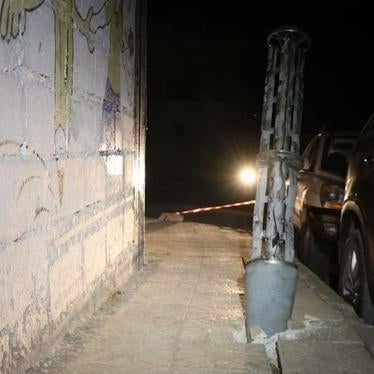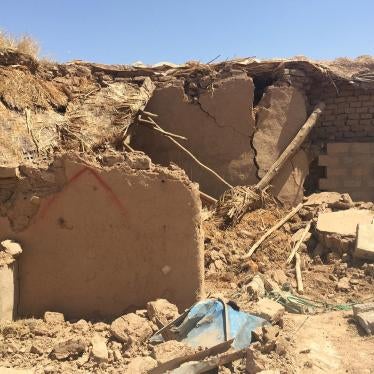“I know what that is!” an 8-year-old exclaimed as he interrupted us explaining recently what cluster munitions are to people displaced by the war in Yemen. “They are big bombs that break up into many smaller bombs in the air.”
That’s as good an explanation as any. When a cluster munition breaks apart in the air, it spreads dozens, sometimes hundreds, of small bombs over a large area, often the size of a football field. If this weapon is used in areas where there are civilians, they are likely to get injured or killed.
It’s sad, but perhaps not unexpected that a boy in northern Yemen should know how a cluster bomb works. Cluster munitions were used in Yemen in past wars and now Saudi Arabia and members of its coalition are dropping bombs and launching rockets with this indiscriminate weapon on populated areas.
The U.S. is providing logistical and intelligence support for the coalition, and if it is providing targeting assistance for cluster munition strikes, it could be complicit in resulting laws-of-war violations. What’s more, the evidence we found of cluster rocket use just a few weeks ago showed that they were manufactured by U.S. companies. U.S. officials have expressed concern at the use of cluster munitions by Syria, South Sudan, Ukraine, and Sudan yet when it comes to the use of cluster munitions by the coalition in Yemen, the U.S. has been silent.
Currently, 117 countries have banned cluster munitions through a 2008 treaty that also requires clearance of their remnants and assistance to victims.
Cluster munitions pose a dual risk to civilians: first, when they explode their small bomblets or submunitions fall indiscriminately over a wide area, meaning that even if aimed at a legitimate military target, civilians may still unlawfully be hurt or killed. But bomblets that failed to explode initially can harm civilians later, sometimes long after the attack. The often-unstable bomblets can explode when children pick them up or animals graze nearby. They can prevent farmers from working their fields, threatening their livelihood.
Three farming villages with about 3,000 people in Hajja governorate in northwest Yemen were hit by cluster munition attacks this summer. One evening, villagers saw the flashes of rockets being launched from the direction of the Saudi border, 20 kilometers away. A little while later, they saw flashes in the air above the village, then heard dozens of explosions, “like the sound when you dump a load of rocks from a truck.”
The attack might have targeted a house used by fighters nearby, but the submunitions fell in the farming land between the three villages, injuring one farmer. Three other farmers were injured later when submunitions exploded as they worked the fields. “We can’t work the fields anymore because of the bombs,” one farmer told us.
Clearing bomblets is dangerous and painstaking work, because it’s not easy to detect them. One farmer wanted to show us what they looked like, but when we arrived at his field, where he’d seen one, the wind had shifted the sand, completely covering the bomblet. We never found it, but it’s still there under the sand, posing a risk to farmers working the land. In another place, sand had covered a bomblet completely except for a small piece of a white ribbon attached to it, barely visible against the sand. We would not have seen it if we were not staring at the ground, looking for it.
During this trip, we identified seven locations newly affected by cluster munitions, including Haradh, the main town in the area. These attacks had killed at least 13 civilians and injured 35 (we only counted people whose names we learned). But cluster munitions may have been used in many more locations resulting in many more casualties. Because of the fighting, we weren’t able to go to areas closest to the border, which were likely most heavily affected.
Saudi Arabia and the other coalition members that are fighting the Houthis, or Ansar Allah, the northern armed group that captured Yemen’s capital last year, have not joined the Convention on Cluster Munitions. They should. The use of cluster munitions we documented demonstrates why so many nations have banned them: they are indiscriminate in violation of the laws of war when dropped or launched near populated areas, and harm civilians long after their initial use.
Governments supporting the Saudi-led coalition, including the United States, should not look away. They should press the coalition to stop using cluster munitions and press for a UN independent commission of inquiry to investigate the attacks. The U.S. also has not signed the cluster munitions convention, but that doesn’t prevent it from calling for an end to their use.
The U.S. is uniquely positioned to do that because of the support it is providing the coalition. Yemen’s war has come at a terrible cost to civilians – eliminating this aspect of that tragedy should be a priority.








